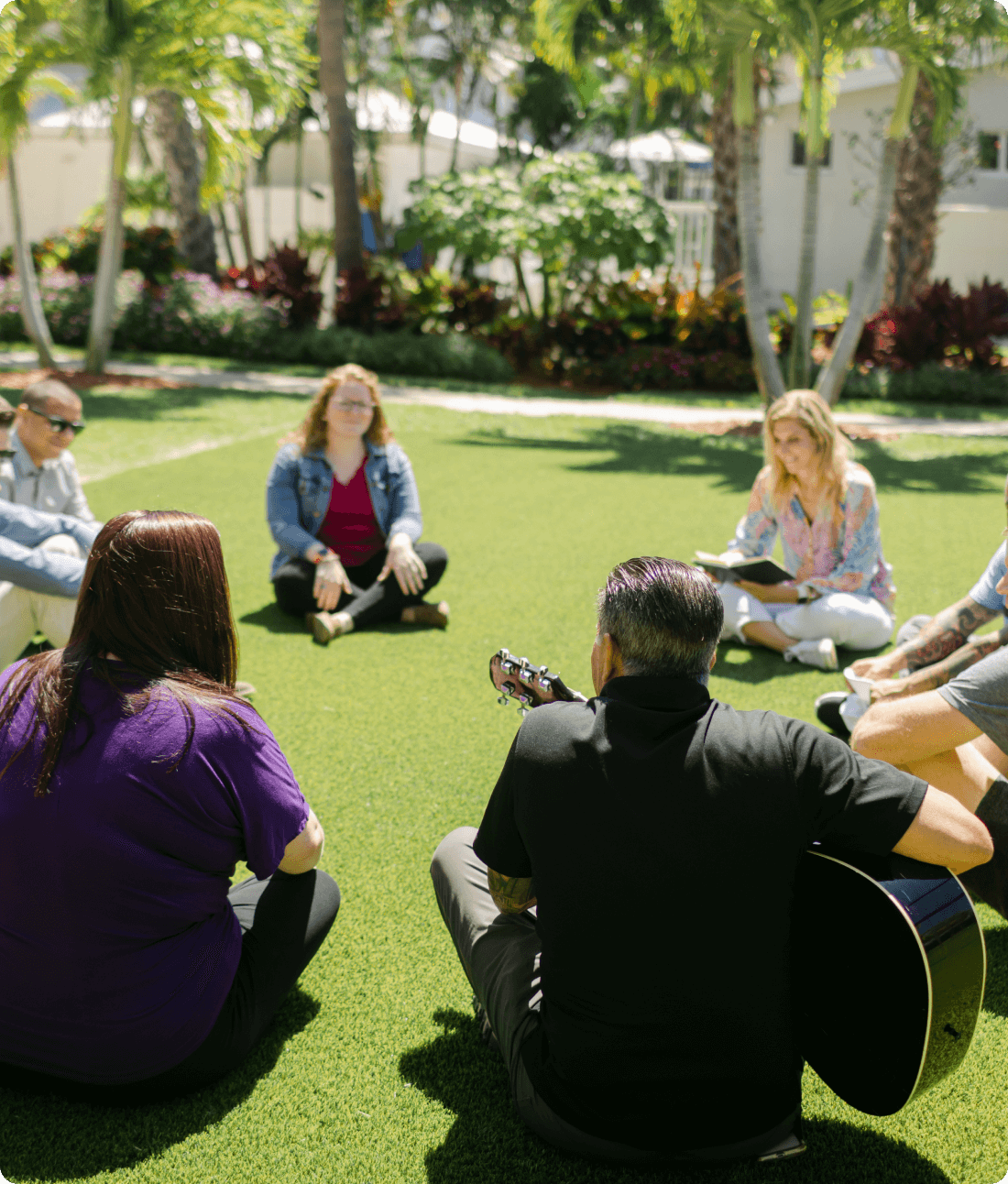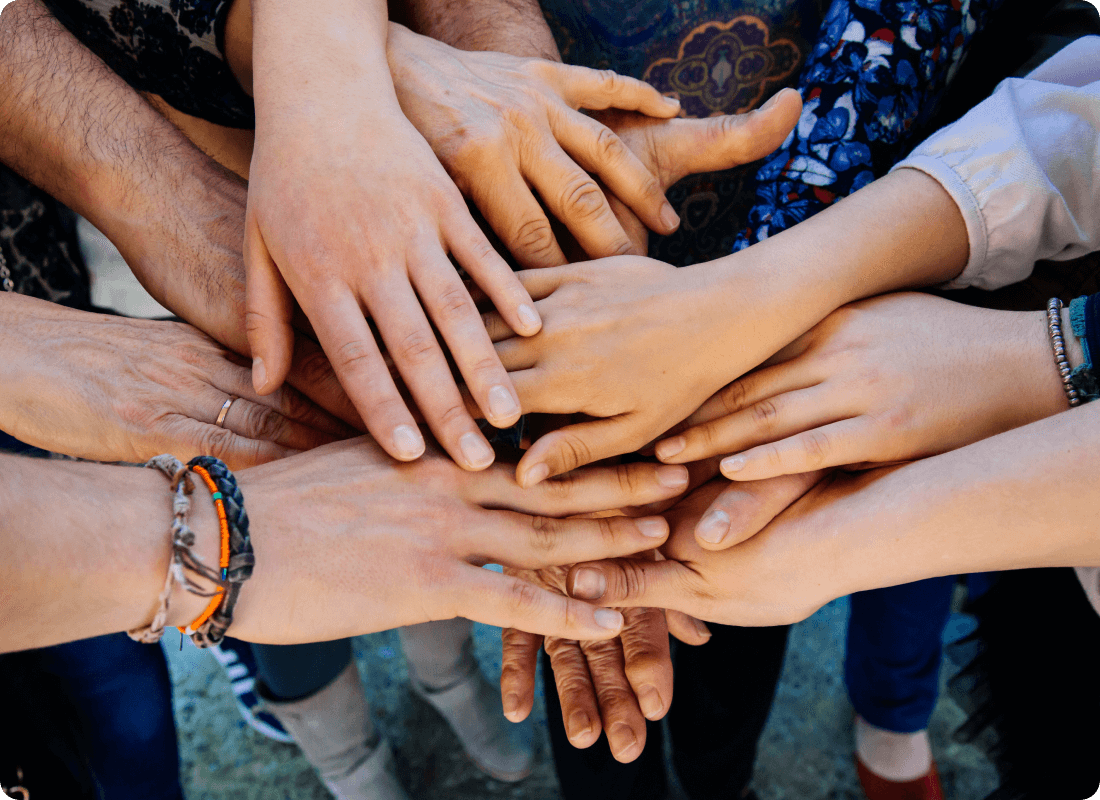

Family Addiction and Mental Health Support in Florida
We believe the disease of addiction and mental health affects many more people than the individual who struggles with those disorders. Family members and friends are deeply impacted by a loved one’s addiction in a myriad of ways. We’ve observed that when the family participates and gains understanding, they increase the likelihood that the person struggling with addiction will shift and make changes.
By utilizing this parallel process, both the family and individuals struggling with addiction or mental health issues navigate their own unique healing journeys simultaneously. Family members are empowered with the skills to remain well and support their loved ones. To achieve this, we provide extensive support to family members, including weekly support groups and individual therapy sessions.
Weekly support groups provide significant benefits to participants through education, interventions, and peer support. These programs offer family members the tools and information they need to navigate difficult situations that arise during their loved one’s battle with addiction and mental health disorders.

Weekly Multifamily Support Groups for Mental Health and Substance Abuse
Dina Sagarese-Coleman, LMFT, offers a weekly support group for family members via Zoom or in person. This is a forum for education and enlightenment, with questions and concerns to be addressed by all participants. The group is available throughout a patient’s treatment. Once a patient is discharged from Beachway Therapy Center, we encourage participants to continue attending Al-Anon, Nar-Anon, or therapy of their own.
Each Wednesday, from 1 p.m. to 2:30 p.m., we hold a mental health support group. From 3 p.m. to 4:30 p.m., the topic shifts to providing substance abuse support. These interactive groups cover various topics, including enabling vs. supporting, maintaining a self-care routine during a loved one’s recovery, and the importance of a year of healing. Participants may be asked questions such as:
-
- How much space is your loved one renting in your head on a scale of 1 to 10?
- What are you no longer willing to do? What will your non-negotiables be moving forward?
- What will your action plan be if your loved one attempts to put you in crisis or reverts to maladaptive behaviors?

The Impact of Addiction on Families and Their Dynamics
In our relationships with family members, we form the initial bonds and behavioral patterns that define our personalities and impact us for the rest of our lives. But what if a family member struggles with substance abuse? Substance abuse threatens to strain family relationships. Alcoholism and drug addiction traumatize and stress the entire family, and without intervention through a family recovery program, trauma can affect an individual for a lifetime.
Living in an intensely emotional environment of fear and manipulation, family members must deal with high stress and anxiety levels. It isn’t unusual for family members to feel like they’re losing their sense of normalcy and self as their loved one’s addiction makes the family dynamics increasingly dysfunctional.
To cope with this uncontrollable situation, family members may resort to hiding the truth from themselves and others, avoiding genuine connections to minimize painful conversations, and feeling intense levels of guilt and shame. These coping mechanisms can keep family members from seeking help.
But just as the whole family suffers when one member struggles with addiction, the entire family is part of the recovery process. Without a family recovery program, family members may suffer effects that last a lifetime.
Watching a loved one struggle with addiction and the physical signs, such as weight loss and uncontrollable rages, can take a lasting toll. Conflict can become the norm as family members attempt to confront their loved one. Trust erodes as the individual attempts to hide their substance use.
Some family members can feel helpless when nothing they do to intervene works, potentially leading them to develop learned helplessness, anxiety, depression, emotional constriction, and even a desire to self-medicate to escape the struggles. Many family members struggle with acknowledging that they can’t force change.
Only the person facing addiction or a mental health disorder can take the steps necessary to recover. Until they’re willing to do that, family members have to take care of themselves to avoid enabling their loved one.
Boundaries for the family of those who struggle with addiction can be a huge part of recovery.


The Process of Family Recovery in South Florida
Recovery may need to happen for both the family and the patient. The family may need to let go of control and obsession about their loved one as much as the patient needs to let go of their addiction. This is an important step in learning how to support someone in rehab.
Trying to treat an individual who struggles with substance abuse without addressing family dynamics would only be treating one facet of the problem. The whole family suffers when one member struggles with addiction, so the entire family may need to be a part of the recovery process.
Beachway’s family recovery process addresses several key steps to help family members of those struggling with addiction, including learning the difference between enabling and support, self-care, and why it’s important to take a year of healing. It also includes aftercare recommendations to help individuals maintain their mental health after treatment.
Family members are encouraged to recognize that the after-effects of a loved one’s addiction can have a ripple effect on their well-being. While their loved one attends treatment, they’re strongly encouraged to do their own work to manage the challenges they may be experiencing. By engaging in a parallel recovery process, the entire family can heal and gain access to support.
Recovery programs can take several forms. External resources, such as Al-Anon, can provide additional guidance in navigating these murky waters.


Beachway's Holistic Approach to Family Healing and Support
Addiction is often called a family disease, as it has so many far-reaching, long-term effects on the family dynamic. Dysfunctional and unhealthy family dynamics brought about by substance abuse and mental health require healing and change.
Family therapy sessions take place in person or over the phone and provide opportunities to address dynamics, communication skills, and aftercare planning while rebuilding broken trust. They also allow families to bolster their support teams and encourage them to seek ongoing support as needed. At Beachway, family therapy sessions are clinically indicated, using data-driven techniques to facilitate a smoother recovery process.
Beachway’s family therapy program can help patients and their loved ones through:
-
- Communication skills and a better understanding of the problem
- Family conflict resolution
- A chance for family members to voice how actions have impacted their lives
- A safe space for participants to express emotions and ask questions about addiction and recovery
- Plans for supporting the patient after treatment
- Learning coping skills for future family challenges
- Discovering ways to rebuild trust and set boundaries
Family therapy is a safe place for families to have productive conversations about the challenges and emotions surrounding mental health and substance abuse.

Start Your Family's Journey to Recovery With Beachway
Addiction and mental health disorders can affect far more than the individual with the diagnosis. Their effects ripple through everyone surrounding them, sometimes leaving gaping emotional and mental health wounds that need treatment. Beachway’s Family Recovery program acknowledges this, bringing loved ones affected by addiction into the treatment process to ensure a holistic recovery process.
Beachway is ready to provide support for families of addicted loved ones. Reach out today to take your first step toward recovery at Beachway’s family recovery center in Florida.

Additional Resources for Families and Friends
of Addicts and Alcoholics
Codependent No More: How to Stop Controlling Others and Start Caring for Yourself by Melody Beattie
Beyond Codependency: And Getting Better All the Time by Melody Beattie
Codependents’ Guide to the Twelve Steps by Melody Beattie
The Language of Letting Go by Melody Beattie
Don’t Let Your Kids Kill You: A Guide for Parents of Drug and Alcohol Addicted Children by Charles Rubin
One Day at a Time in Al-Anon by Al-Anon Family Group Head Inc
Courage to Change: One Day at a Time in Al-Anon II by Al-Anon Family Group Head Inc
Addict in the Family: Stories of Loss, Hope and Recovery by Beverly Conyers
Everything Changes: Help for Families of Newly Recovering Addicts by Beverly Conyers
Beautiful Boy: A Father’s Journey Through His Son’s Addictions by David Sheff
Alcoholics Anonymous (Chapters 8 and 9: To Wives and The Family Afterwards) by AA World Services


The Challenges of Learning
How To Support Someone in
Rehab
The first hurdle when learning how to support someone in rehab may be keeping the patient in treatment. The vast majority of people coming into treatment will want to leave prematurely at some point. The “fight, flight or freeze” response to stress – and treatment can be stressful. Often this happens in the first few days when the patient is still detoxing and is uncomfortable.
The desire to stop the discomfort and pain can overcome any rational thinking, and the denial can be so powerful that the patient is unaware that they aren’t making smart choices. The family has to be strong enough to say no to their loved one when they ask to come home. Sometimes this might mean removing all access to funds, not taking phone calls, and allowing the patient to confront their own discomfort.
The dichotomy is that the more the family tries to help or rescue their loved one, the more they actually enable or contribute to the disease and potentially prevent them from recovering.



